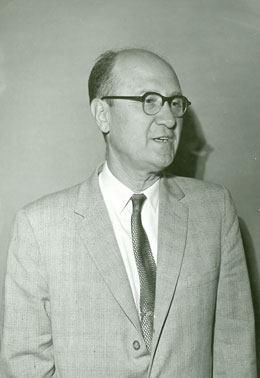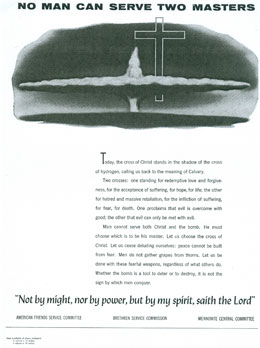By Andrew Pankratz
Politics and political involvement has, at times, presented various issues and challenges to the Church of the Brethren. How involved could a Brethren become in the political process while remain true to their faith? If the government used force and fought wars, should the Brethren hold any governmental office or even vote? The answers to this question have changed over time from the beginning of the Brethren to the present day.
Up until 1850, Annual Conference consistently recommended that members refrain from voting or attending political meetings.
Prior to the American Civil War (1861-1865), the majority of Brethren members did not vote in elections, believing that by voting, one may put someone in office that would vote for war, which would be unconscionable for the Brethren. Up until 1850, Annual Conference consistently recommended that members refrain from voting or attending political meetings.1 In the 1850 and 1852 Annual Conferences, it was decided that Brethren could hold a governmental office if approved by a committee from their church and that Brethren could vote if they did it quietly. After the Civil War, the Brethren slowly became more involved in politics until the majority of the Brethren membership participated on election days by World War I. The catalyst for this change was the temperance movement of the late 1800s and early 1900s, which gave the Brethren members a moral issue to rally behind.2
Even with this increased involvement in politics, many Brethren still hesitated on how much involvement in politics was too much. A committee report in the 1912 Annual Conference recommended “that the brethren not vote nor accept an office of any kind unless they are convinced that by so doing they can more completely [ful]fill their mission in the world relative to themselves, to their fellow-men and to God.”3 In the years following World War I (1914-1918), Brethren involvement in politics began another gradual change. The Brethren began to realize that they must use their peace witness to promote what is good throughout the church, home, and state.4 This mission to spread their peace witness, led to greater political involvement by the members of the Church of the Brethren.

One proponent of this increased political involvement was Kermit Eby during the 1950s. Kermit Eby (1903-1962), while growing up Brethren and eventually becoming an elected minister in the church, became quite involved in politics and the labor movement. From 1937-1942 Eby served on the Chicago Teachers Union and then on the Congress of Industrial Organizations from 1945-1948. Then from 1950 to 1962, Eby served as a professor of social sciences at the University of Chicago.5 Due to his heavy involvement in the labor movement, Eby developed a new outlook on political involvement that he then wrote about prolifically.
Kermit Eby urged the Brethren, and Protestants in general, to develop a more long-term, integrated, and involved political strategy. For Eby, the Brethren could not afford to remain uninvolved in politics. According to Kermit Eby, in his early years the Brethren lived in a simple, face-to-face, world.6 These Brethren had a clear set of values and acceptable actions, while those values or acts outside their group simply did not exist for them. Since many of the Brethren in the early 1900s were farmers, the moral problems of the city or politics simply made no sense or even existed to them. The Brethren focused on excluding those acts and temptations that posed the most danger, and thus the Brethren strictly separated the world and the church.7 By the 1950s, though, this simple world had irrevocably changed to a complex and impersonal world.8In other words, the Brethren had to adapt their view on politics to meet the coming of the modern world.
Politics, Kermit Eby argued, was a natural phenomenon and existed in every human institution from the state, to the church, to the family. If politics is a natural aspect of human life, then no one can fully separate themselves from some form of political involvement. Unfortunately, many of the decisions and political actions of the church come through indecision and political inaction. For Eby, to complain about government corruption and actions but failing to participate in politics is basically aiding the government’s corruption. Essentially, political inaction becomes a new form of the sin of omission that Jesus preached against.9 In other words, Eby argues that the Brethren, by refusing to become involved in politics, committed the sin of omission and that their political inaction is a form of political action in itself.

Instead, Eby argues that Christians should not leave politics or society to chance but instead should develop responsible, knowledgeable, informed Christian citizens who hold to their beliefs and are willing “to take the buffetings of the power struggles which take place in life.”10 The church needed to abandon its aloofness towards politics so as to once again become agents “of moral stimulation and social responsibility” in American society.11 Eby cautions the Brethren, though, that he is not recommending that the Church of the Brethren itself should necessarily become involved in politics. In other words, the members of the church should not look to Elgin, Illinois to determine how they should act politically, according to Eby.12The role of the church, instead, is to create a climate within the church that would compel its members to become more politically active. Kermit Eby argues that the church is the key institution in society in instilling values and integrity into their members.13 In many cases, the church instills a set of values and integrity into the members of the church. For Eby, America will only have good politicians if they are first trained as good men and women and then trained as good politicians.14 America needs, according to Eby, more politicians of integrity and responsibility, and only the church can bring that about. Essentially, Kermit Eby is arguing that the members of the Church of the Brethren could begin to change the political system of America through raising their members as virtuous men and women of integrity who would then become politically active.
Kermit Eby’s vision for the Church of the Brethren called for increased political involvement of it members. For the first two hundred years, the Church of the Brethren separated itself from the world and largely rejected full political involvement. For Kermit Eby, this separation from the world needed to stop if the Brethren hoped to spread their peace witness throughout America. By raising their young to be men and women of virtue and integrity, while also politically active, the Brethren could begin to change the political atmosphere of America. This vision, while dating from the 1950s, can still serve as an inspiration to the church today.
1 Bowman, Rufus D. The Church of the Brethren and War. Elgin, IL: Brethren Publishing House, 1944. Pg. 107.
2 Bowman, Pg. 164.
3 Minutes of the Annual Meeting of the Church of the Brethren: York, PA., June 4, 1912. Pg. 3.
4 Bowman, Pg. 166.
5 “Kermit Eby.” The Brethren Encyclopedia. Vol. 1 (A-J). Oak Brook, IL: The Brethren Encyclopedia Inc., 1983. Pg. 419.
6 Eby, Kermit. “Face to Face Ethic in a Complex World.” Pg. 2.
7 Eby, Kermit. “A Confession of Bias.” Pg. 1.
8 Eby, “Face to Face Ethic in a Complex World.” Pg. 2.
9 Eby, Kermit. “What Every Citizen Should Know About Politics.” Progressive Education. 29:7 (May 1952). Pg. 234.
10 Eby, Kermit. “Functional Citizenship.” Pg. 13.
11 Eby, Kermit. “Wanted: A Protestant Political Strategy.” July 6, 1950. Sermon at Bond Chapel, University of Chicago. Pg. 3.
12 Eby, “Wanted: A Protestant Political Strategy.” Pg. 4.
13 Eby, “Wanted: A Protestant Political Strategy.” Pg. 5.
14 Eby, “Wanted: A Protestant Political Strategy.” Pg. 6.